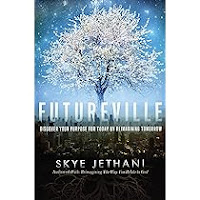 |
| (Amazon UK link) |
I nearly gave up after the first few pages, as the focus seemed to be on some long-ago exhibition in the United States (in 1939) which the author assumed readers would know about. Perhaps it’s cultural knowledge in the US, but I had no idea what it referred to.
However, it was gradually explained: apparently there was a huge exhibition with someone’s idea about a future world. People in the United States were encouraged to see this projection of the future. The author goes on to say that he saw a different projection of the future in Disneyworld when he was a child.
It turns out that these are simply illustrative examples of what some folk think the future might be like. The author moves swiftly on to say that in church circles there tend to be two ideas about the future, both of them based on Bible verses, but neither fully consistent with the whole message of Scripture.
The first he calls (a tad ironically) ‘evolution’ - the idea that the world will gradually get better, until it’s perfect, and then Jesus will return. He said that idea was popular until the 20th century, when it was realised that wars are increasing, violence is more overt, and technology doesn’t necessarily make life any better.
The second idea he calls ‘evacuation’, and that’s the one I’ve come across in evangelical (and other) circles: the idea that we have to put up with this world, with our trust in Jesus, and hope that we’ll be taken away from it into some other realm after we die. People who take this view to the extreme don’t think there’s much point looking after the world, or caring for the environment since it’s all going to be burned up anyway.
Skye Jethani takes a third, broader perspective which he justifies through many Bible verses and ideas, not just a few: the idea that at some point God will transform our world, with all that’s evil destroyed, and all that’s good remaining. The ‘new’ heaven and earth described in the Bible, he claims, doesn’t mean ‘newly made’, but something like ‘new to us’ or ‘renewed’.
And I could see that what he said makes sense. Indeed it’s one of those things that seemed immediately obvious when I thought about it, although I hadn’t previously seen it explained so clearly, contrasted with other views. He goes on to say that God’s initial creation of the world featured order, beauty and abundance. Our world now consists of a great deal of disorder, ugliness and scarcity, but one day there will be a new earth - a huge and beautiful ‘city’ as described in Revelation - where people come and go freely, with no ugliness, no chaos, and nobody in want.
The second half of the book looks at the three features in more detail, and suggests that those of us who follow Jesus with hope for the future should see what we do in these terms. It’s not just clergy and missionaries who should be seen as special - we all have roles to play. Creating order certainly includes introducing people to God, and restoring relationships, but also more practical things: cleaning a house, installing or improving plumbing, turning raw ingredients such as clay or sand into useful objects. I could immediately see the value of - for instance - baking, knitting, or even putting books on shelves in some kind of order.
The chapter on beauty is also encouraging to those who feel that the arts are sometimes marginalised - believers who write, or paint, or dance, or create music are sometimes made to feel that their work is less valued if it’s ‘secular’ rather than overtly pointing to God. This is something I was aware of, and believe strongly already. We are to be salt and light, and all we create should be good, free of ugliness; good art of any kind can point people to a creative God whether or not there is a ‘religious’ message in it.
The section on abundance was more predictable, perhaps, pointing out the value of sharing the world’s resources, of the importance of looking after our planet, offering what we have, whether a lot or little, to those in need around us. It affirms the importance of businesspeople, or those with wealth or in politics who have the power or ability to provide better lives for those in need.
I did feel the text started to be a bit repetitive at times, particularly the final chapter which pulled everything together. But overall I thought it a most encouraging read, one that helped me clarify my own beliefs and understanding about the world to come.
I couldn’t manage more than about ten pages per day, as there was quite a lot to ponder. It’s not lightweight, but the writing is good, and on the whole I’d recommend it highly to anyone who is trying to follow Jesus and wonders what value their life has.
Review copyright 2023 Sue's Book Reviews
No comments:
Post a Comment